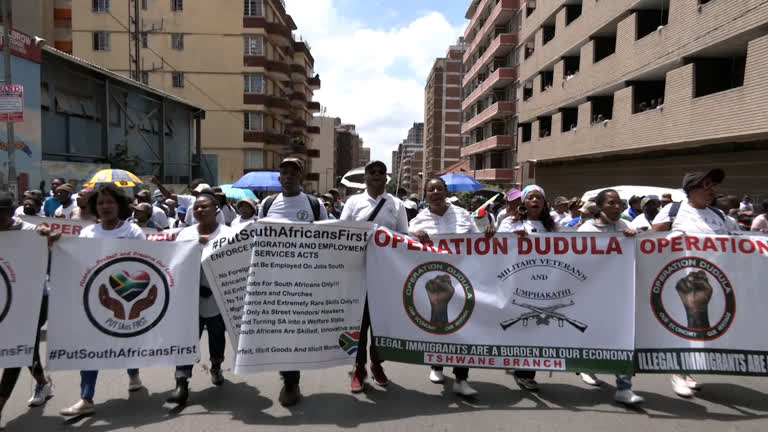
Operation Dudula: Hundreds of Anti-Migrants March Through Hillbrow to ‘Take Back South Africa’
Shopkeepers pulled down their metal shutters and foreign staff stayed out of sight as hundreds marched through Hillbrow in Johannesburg, demanding that migrants leave and that their jobs go to South Africans. The march through dilapidated Hillbrow, where many African migrants live, was organised by Operation Dudula, a vigilante group whose activities have raised fears […]

Shopkeepers pulled down their metal shutters and foreign staff stayed out of sight as hundreds marched through Hillbrow in Johannesburg, demanding that migrants leave and that their jobs go to South Africans.
The march through dilapidated Hillbrow, where many African migrants live, was organised by Operation Dudula, a vigilante group whose activities have raised fears of renewed violence against foreigners, a recurring problem. As reported by Carte Blanche a couple of weeks ago, the Xenophobic violence that ravaged the country in 2008 left an enduring stain on the new South Africa. In 2015, one highly placed leader referred to immigrants as fleas and violence erupted immediately. Now, Operation Dudula – a Soweto-born movement consisting of citizens reportedly targeting foreign traders and alleged criminals – is spreading the call to #PutSouthAfricansFirst; and politicians are also pointing to foreigners as the cause of South Africa’s hardships. (You can watch Carte Blanche overseas on Showmax International, or in SA on DStv Now.)
Dudula means “push back” in Zulu. The group blames high crime rates on undocumented migrants, who it also accuses of taking away jobs from South Africans and driving down wages.
“We want to see the people of South Africa reclaiming the control of South Africa … and playing a meaningful role in terms of economic activities rather than being spectators,” said Dan Radebe, one of the leaders of the group.
“You cannot sit at more than 50% unemployment rate and still have room to employ illegal migrants,” he said.
South Africa’s official unemployment rate is at a record 35.3%, though it is even higher by other measures.
Campaigners for migrant rights say foreigners are being scapegoated for economic woes rooted in profound structural problems and for the failure of successive governments to convert post-apartheid freedoms into widespread prosperity.
The leader of Operation Dudula, Nhlanhla “Lux” Dlamini wears paramilitary-style camouflage gear and speaks of “taking back” South Africa. He was arrested last week and is facing charges of housebreaking and malicious damage, in connection with an incident at a private home. Dlamini’s lawyer has said he is innocent.
The group has been linked to incidents of violence in townships against foreigners, who come from all over Africa, including Nigeria and countries in southern Africa.
President Cyril Ramaphosa said last week that those behind Operation Dudula were contravening the law.
“We cannot allow a situation where we are going to get people who will embark on vigilantism to deal with a problem, a social problem,” he said.
Some civil society groups have staged counter-protests, marching through Hillbrow carrying banners with slogans such as “No To Xenophobia” and “We Are One Africa”.
Human rights lawyer and activist Sharon Ekambaram said an increasing number of politicians were making statements hostile to migrants. She cited the recent suspension of a special permit for Zimbabwean migrants as a sign of growing official hostility.
“These are all signs that the state is blaming migrants for the problems in our country and in that climate, the emergence of Operation Dudula is of serious concern, their actions of attacking foreign nationals in various townships,” she said.
Zimbabwean national Siyayi Chinemhute, who resides legally in South Africa, said members of Operation Dudula, some armed with guns, sticks and whips, had invaded the community centre in Soweto where he works and lives with his family.
“Some of the group actually came in, went in all over the place, searching all the place and banging the doors,” he said, adding that they were chanting “mabahambe” or “they must leave”.
“For me as a father, not only to my immediate family but to the broader community, it actually traumatised me because I was thinking to myself, ‘what is going to happen now?’.”
Source: Reuters and Carte Blanche
